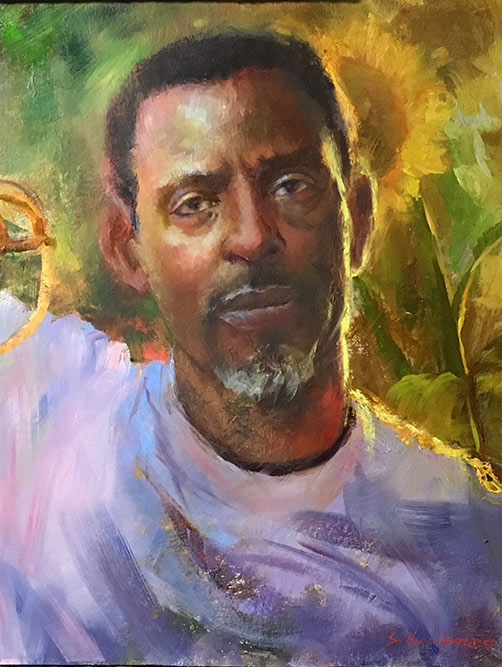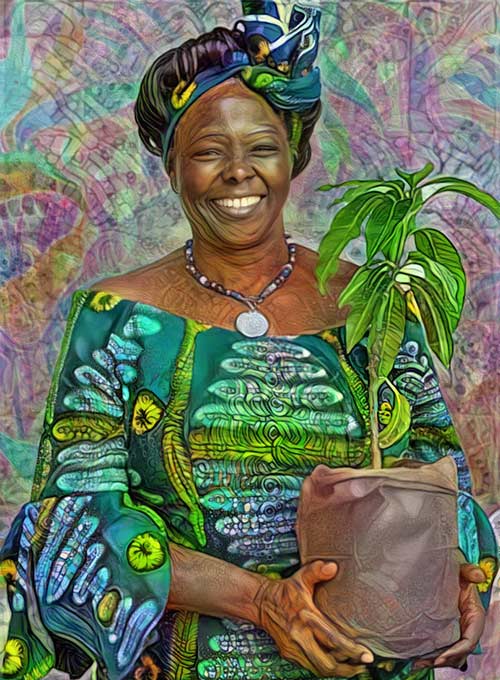By Liz Nye, New England Botanic Garden
January 2025
Ron Finley started a food revolution in 2010 with a single bold action — he planted a garden without a permit. His South-Central LA neighborhood lacked access to fresh produce, so Finley decided to use the neglected strip of soil between the sidewalk and the street to grow vegetables, something the City considered a crime. In response to charges, Finley organized with fellow activists, demanding the right to grow food in their neighborhoods. He won, and today, the nonprofit Ron Finley Project addresses the problem of food deserts and builds community through creative urban farming.

Ron Finley, food justice activist and founder of the nonprofit Ron Finley Project. Portrait by Susan Hong-Sammons.
Finley’s is one of many impactful and important stories celebrated through the Garden’s Horticultural Heroes exhibition, a traveling portrait collection that pays homage to the groundbreaking contributions of thought leaders — historical and contemporary — in the fields of horticulture, botany, conservation, environmentalism, agriculture, and food justice. This winter, the exhibition expands to spotlight ten new trailblazers, women and BIPOC leaders who have made or are continuing to make a lasting positive impact on our world. Their portraits, created by talented local artists, will be unveiled in the Garden’s Visitors Center during February and March in celebration of Black History Month and Women’s History Month.
Who are our Heroes?
Joining the ranks of this unique exhibition are individuals from diverse backgrounds whose horticultural heroics include pioneering research and leading social activism. They include: Gladys Tantaquidgeon (1899-2005), a Mohegan medicine woman, tribal elder, anthropologist, and ethnobotanist who dedicated her life to preserving and promoting Mohegan tribal traditions and knowledge of herbal medicine; Dr. Marie Clark Taylor (1911-1990), a leading figure in horticulture and botanical research who became the first Black woman to earn a PhD in botany and conducted groundbreaking research on plant diseases and their prevention; and Ietef Vita, also known as “DJ Cavem,” a contemporary award-winning artist, educator, and vegan chef, who promotes eco-consciousness and sustainable living through his music and community work.
Horticultural Heroes was developed in 2018. As was done then, a different artist has been commissioned for each portrait. Artists celebrate their subjects in a range of styles and media including oil, encaustic, watercolor, collage, embroidery, acrylic, cast glass, egg tempera, digital AI, pyrography on wood, and others. The result is a vibrant, visually striking exhibition that, with the new expansion, amplifies the legacies of 30 leaders in the field. Alongside the portraits, Garden visitors will find QR codes that lead to brief narratives detailing the stories of these influential figures.

Wangari Muta Maathai, the first African woman and first environmentalist to win a Nobel Peace Prize for contributions to sustainable development, democracy, and peace. Portrait by Dr. Nettrice R. Gaskins.
Upcoming Lectures Offer Continued Learning
In connection to the portraits being on display, the Garden’s Inclusivity, Diversity, Equity, and Accessibility (IDEA) Committee is offering a free online lecture series aimed at creating additional opportunities to learn about history, engage with important social and environmental justice topics, and celebrate diverse voices in horticulture. The series features Black in the Garden podcast creator Colah B. Tawkin, horticulturist and researcher Tracy Qiu, and author of Black Faces, White Spaces: Reimagining the Relationship of African Americans in the Great Outdoors, Caroyn Finney. Join us for all three!
Don’t Forget, Horticultural Heroes Travels
Sharing the stories of our Horticultural Heroes is an essential element of the vision for this exhibition. That’s why it was designed to travel. To learn more about opportunities to showcase this unique and enriching collection at a gallery, museum, academic institution, or other organization, contact the Garden’s Exhibitions Manager Lea Morgan at lmorgan@nebg.org.
Liz Nye is the Public Relations Manager at New England Botanic Garden. She holds a master’s degree in science writing from Johns Hopkins University and enjoys learning about and writing about all things plants.
